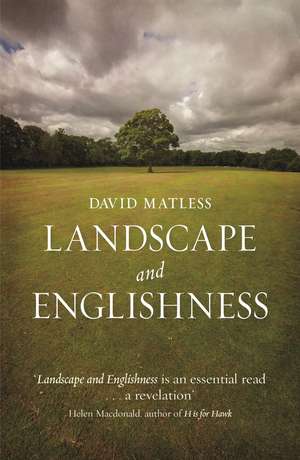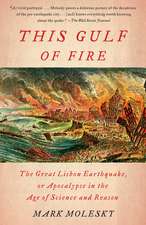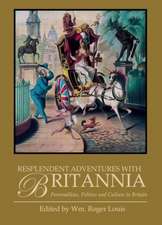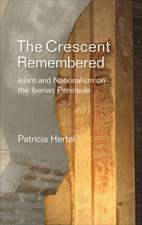Landscape and Englishness: Second Expanded Edition
Autor David Matlessen Limba Engleză Paperback – 15 sep 2016
As David Matless argues in this book—updated in this accessible, pocket edition—landscape has been central to definitions of Englishness for centuries. It is the aspect of English life where visions of the past, present, and future have met in debates over questions of national identity, disputes over history and modernity, and ideals of citizenship and the body. Extensively illustrated, Landscape and Englishness explores just how important the aesthetics of Britain’s cities and countryside have been to its people.
Matless examines a wide range of material, including topographical guides, health manuals, paintings, poetry, architectural polemics, photography, nature guides, and novels. Taking readers to the interwar period, he explores how England negotiated the modern and traditional, the urban and rural, the progressive and preservationist, in its decisions over how to develop the countryside, re-plan cities, and support various cultures of leisure and citizenship. Tracing the role of landscape to Englishness from then up until the present day, he shows how familiar notions of heritage in landscape are products of the immediate post-war era, and he unveils how the present always resonates with the past.
Matless examines a wide range of material, including topographical guides, health manuals, paintings, poetry, architectural polemics, photography, nature guides, and novels. Taking readers to the interwar period, he explores how England negotiated the modern and traditional, the urban and rural, the progressive and preservationist, in its decisions over how to develop the countryside, re-plan cities, and support various cultures of leisure and citizenship. Tracing the role of landscape to Englishness from then up until the present day, he shows how familiar notions of heritage in landscape are products of the immediate post-war era, and he unveils how the present always resonates with the past.
Preț: 78.05 lei
Nou
Puncte Express: 117
Preț estimativ în valută:
14.94€ • 16.22$ • 12.55£
14.94€ • 16.22$ • 12.55£
Carte disponibilă
Livrare economică 01-15 aprilie
Livrare express 18-22 martie pentru 27.53 lei
Preluare comenzi: 021 569.72.76
Specificații
ISBN-13: 9781780235813
ISBN-10: 178023581X
Pagini: 368
Ilustrații: 81 halftones
Dimensiuni: 127 x 197 x 41 mm
Greutate: 0.43 kg
Ediția:2nd Edition
Editura: REAKTION BOOKS
Colecția Reaktion Books
ISBN-10: 178023581X
Pagini: 368
Ilustrații: 81 halftones
Dimensiuni: 127 x 197 x 41 mm
Greutate: 0.43 kg
Ediția:2nd Edition
Editura: REAKTION BOOKS
Colecția Reaktion Books
Notă biografică
David Matless is professor of cultural geography at the University of Nottingham. He is the editor of The Place of Music and author of Geographies of British Modernity.
Cuprins
Passport to Plenty: Preface to the 2016 Edition
Introduction: Versions of Landscape and Englishness
Part I: Landscape for the new Englishness
Part II: Organic England
Part III: Landscapes of War and Reconstruction
Part IV: Festivals and Realignments
References
Select Bibliography
Acknowledgments for the 1998 Edition
Acknowledgments for the 2016 Edition
Photographic Acknowledgments
Index
Introduction: Versions of Landscape and Englishness
Part I: Landscape for the new Englishness
- Ordering England
- Arts of Living: Landscape and Citizenship, 1918-39
Part II: Organic England
- English Ecologies
- The Organic English Body
Part III: Landscapes of War and Reconstruction
- Landscapes of War
- Geographies of the Reconstruction
- Citizens of Reconstruction
Part IV: Festivals and Realignments
- Landscapes and Englishness in an Altered State
References
Select Bibliography
Acknowledgments for the 1998 Edition
Acknowledgments for the 2016 Edition
Photographic Acknowledgments
Index
Recenzii
“Landscape and Englishness is an essential read for anyone interested in why some kinds of interaction with nature are celebrated and others are frowned on. Drawing on a huge diversity of sources—books, films, preservationist tracts, walking guides, novels, music-hall songs, Ministry of Information pamphlets, maps, and festival guides—Matless reveals how our assumptions about landscape and national identity were forged in the decades between the Great War and the 1950s, and how deeply they’ve been shaped by history, class and politics . . . a revelation.”
“Creates a convincing portrait of the changing meanings of the English landscape in the twentieth century. . . . This book is filled with enjoyable cameos of writers, painters, poets, and naturalists, but it is also a thoughtful portrayal of the city and the shifting ideology of modernity.”
“Already after the first world war the spread of what the countryside alliance of those days saw as the ‘blight’ of suburbia evoked a cacophony of resentment. Matless, a geographer, has rummaged purposefully among the gargoyles.”
“The best book so far on the interpretation of landscape in the middle years of the twentieth century.”
“This richly suggestive book draws on the kind of discarded material you might find gathering dust and fungus in a remote second-hand bookshop somewhere in ‘middle-England.’. . . this book offers rich pickings for art historians who will look at Paul Nash, Graham Sutherland, and even Richard Long and Hamish Fulton afresh.”
“Cultural history at its best: subtle, multi-layered, and full of new ideas and insights. . . . This book is a ‘must.’”
“Engrossing and important . . . Beneath the agitated and often opposing arguments about the proper treatment and use of the rural landscape are many and deep reverberations, touching issues of social, economic, aesthetic, and political sensitivity.”
“An interesting book, full of intriguing material, subtle arguments, illuminating insights. There is a wealth of illustrations and the book is very well produced . . . it is a work of real importance . . . it reads as much as a work of the heart as well as the mind.”
“A richly informative text.”
“As a wide-ranging and perceptive account of competing visions of England during a period of tremendous social change, out of which a distinctly new yet supposedly familiar landscape emerged, this book reminds us that landscape in itself and through its representations is a manifestation of culture, and that by studying it we are participants in its continuous and often contentious reevaluation. Landscape and Englishness deserves attention from anyone engaging with this issue.”
“The easy, loosely chronological narrative and the generous number of illustrations make the book an engaging read, challenging at whatever level of analysis the reader chooses. What stays with me after reading it is the eagerness of the mid-twentieth-century decision makers to think differently about landscape and to embrace change.”
“Matless’s approach gives free rein to the breadth and depth of his knowledge, his characteristic ability to make all kinds of connections, to tell a convincing tale—almost a yarn—about England, with a smattering of the quirky and eccentric. . . . This scrupulously researched book will be of interest to geographers and others interested in the power of landscape to inform English national identity.”
“This is a beautifully produced book, lavishly illustrated and meticulously footnoted. . . . The themes are provocative and give this book its relevance to those involved in the visual arts.”
“A beautifully accessible piece of old technology in the form of a book which could also be described as a study of images of England. . . . The book applies a penetrating searchlight to the assumptions about the rural environment promoted by propagandists and interest groups in the pre-war and wartime years and their relationship to national consciousness and popular sentiment. . . . We should be grateful for this evocation of all our yesterdays.”
“A wonderful read, cautious yet informed in its use of theory, sensitive to local and wider contexts, unafraid of detail without being swamped by it, often very funny and beautifully produced and illustrated . . . likely to be one of the lasting achievements of the ‘new’ cultural geography.”






